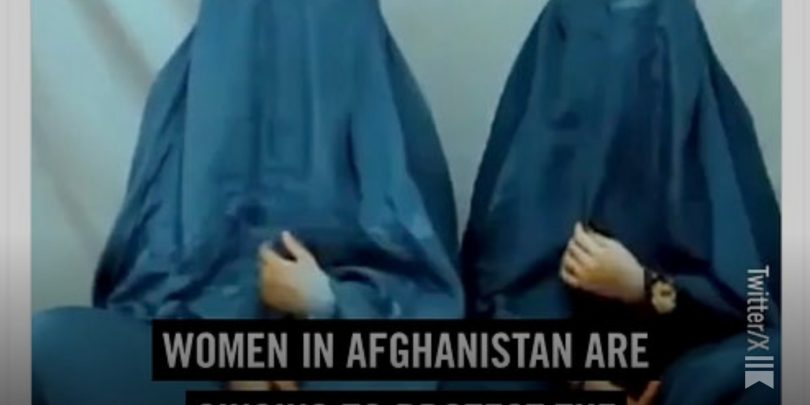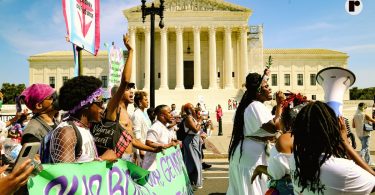Late last month the Taliban published new restrictions aimed, it said, at combating vice and promoting virtue. The 35-article document, which includes a raft of draconian laws, deems women’s voices to be potential instruments of vice and stipulates that women must not sing or read aloud in public, nor let their voices carry beyond the walls of their homes.
Since taking power again in 2021, the Taliban have created the worst women’s rights crisis in the world. Their latest decrees have horrified rights organizations, triggered widespread condemnation and accusations that the Taliban are erasing women from public life and granting broad powers to enforcers from the Vice and Virtue Ministry. The decrees have galvanized Afghan women to fight back by posting videos of themselves singing, some in public inside Afghanistan.
A woman who posted a video of herself singing outdoors in Afghanistan to protest the Taliban’s morality laws told the Associated Press on Thursday she won’t be silenced.
The 23-year-old graduate is from the northeastern province of Badakhshan and only gave her last name, Efat, to avoid reprisals.
No command, system or man can close the mouth of an Afghan woman…If you close one part of the body of an Afghan woman, another part will work.- Efat
Efat’s face is barely visible in the 39-second video, which was recorded by her older sister. She chose the song because of its message of defiance, protest and strength.
I am not that weak willow that trembles in every wind/I am from Afghanistan/I remember that day when I opened the cage/I took my head out of the cage and sang drunkenly.
Other videos showed women in Afghanistan singing alone or in small groups, using hashtags such as “#My voice is not forbidden” and “#No to Taliban” as they raised their voices against what UN officials have described as a “gender-based apartheid”.
The new laws also force women to wear thick clothes that completely cover their bodies – including their faces – while in public, and bans them from looking directly at men they are not related to by blood or marriage.
Those who fail to comply with the restrictions can be detained and punished in a manner deemed appropriate by Taliban officials.
Flyers and other items are displayed on a table, as people attend the “your voice against the right” protest against the Alternative for Germany (AfD), ahead of the state elections in Saxony and Thuringia, in Erfurt, Germany, August 25, 2024. REUTERS/Karina Hessland
Activists warn the expected success of the far-right Alternative for Germany (AfD) in September elections in three eastern German states could put LGBTQ+ rights at risk across the country.
The AfD came first in the state of Thuringia and a close second in Saxony on Sept. 1, and polls suggest they will come first in Brandenburg on Sept. 22, with between 24% and 30% of the vote.
It would be the first time a far-right party has been the largest in a German parliament since World War Two.
Despite having an openly lesbian co-leader, Alice Weidel, the AfD has become the loudest voice against LGBTQ+ rights in the federal German parliament.
In 2019, it filed a motion to revoke same-sex marriage and in a manifesto ahead of the Thuringia election, it said: “Our political family ideal is that of the family of a mother, a father and children”.
The manifesto also said the AfD rejected “gender ideology”, pledged to ban “third parties” from delivering sex education lessons in schools and stated that “politically motivated programmes have no place in schools”.
The AfD unsuccessfully sought to challenge a law that passed the German federal parliament in April making it easier for trans people to change their legal gender.
Activists say the rise of the far-right could endanger the public funding that many LGBTQ+ charities rely on. They are also concerned about growing anti-LGBTQ+ violence, both online and offline.
Since late July, hundreds of far-right protesters have tried to disrupt Pride marches in the eastern cities of Leipzig and Bautzen, where they chanted racist and neo-Nazi slogans with at least one protester seen performing the Hitler salute.
Now we find ourselves having to figure out how to keep the participants of our Pride marches safe. Years ago, that topic wasn’t even on the table. -Theresa Ertel, coordinator of the Pride march in Jena, a city of 111,000 in Thuringia
Cameroonian novelist Musih Tedji Xaviere (Photo: Dirk Skiba)
Novelist Musih Tedji Xaviere explores forbidden love, self-censorship and the complexities of same-sex relationships in Cameroon in her first novel, These Letters End in Tears.
The title is a nod to a saying elders have when a child is being stubborn and they say “this behaviour will end in tears.” The novel is written in the form of imagined letters from Bessem, a university professor, to her first love, Fatima, who disappeared 13 years ago and whom Bessem never stopped loving.
In Cameroon, same-sex relationships can be punished by law with fines and up to five years imprisonment. Xaviere took the precautionary measure of moving to the UK before the book’s publication.
People still find love – there’s nothing you can do to stop people from loving. Even in places where it’s forbidden, people still find love. I’m a hopeless romantic, I can’t help thinking love will solve it all. -Musih Tedji Xaviere
In a 9 July interview with the French newspaper Le Parisien, Brenda Biya, 27, daughter of Cameroon’s President Paul Biya, came out and called for the decriminalisation of consensual same-sex conduct in her country.
Xaviere said she worked up the courage to tackle the subject during the Covid-19 pandemic, when the future seemed uncertain, and she wondered why people accepted negativity about homosexuality, and why she had “wasted all these years being afraid. Covid woke a lot of people up and I was one of them”.
Photo: Patrick McDermott/Getty Images
The Philadelphia Marathon will award equal prize money to the male, female and nonbinary categories of its open division races this year. Though the marathon established a nonbinary division in 2022, Philadelphia Gay News (PGN) reported that winners in that category have never received prize money.
Per CBS News, Philadelphia city officials announced the change August 22. According to the marathon’s website, first place runners in the male, female, and nonbinary categories of the open division full marathon will receive $4,000 and an award. Second place runners will receive $2,000 and an award, and third place runners will receive $1,000 and an award. Participants in the open division half marathon and the 8K will also receive cash prizes.
However, this change only applies to the non-professional races. According to PGN, the race also has an elite division in which about 100 professional runners compete. First place winners in the elite division receive $10,000 each — but only for the men’s and women’s categories. The marathon has yet to establish a nonbinary category for elite athletes.
Last November, Philadelphia Marathon officials told CBS News that they didn’t establish such a category due to the guidelines of USA Track and Field, their national governing body, which also does not have a division for elite nonbinary runners.
Nonbinary runner Josh Fernandez told PGN that the lack of a nonbinary category in the elite division sends a message that running is merely a hobby for athletes who identify outside of the gender binary.
I want to build a path for the next Nikki Hiltz to not have to compete in a gender division that doesn’t match their identity. -Josh Fernandez
Hiltz recently made history at the 2024 Paris Olympics as the first out nonbinary athlete to advance to an individual Olympic finals event, alongside shot-putter Raven Saunders.
Al Jazeera’s Backstage features two female bands finding new audiences in Yemen and Oman.
Passion of the Heart is a small family group in the Yemeni capital Sanaa. It’s led by Amina al Amrani, who was forced to decide between divorce and her music career – and became a single mother after choosing singing over her husband. Her group can still only perform at women-only gatherings and weddings.
The Omaniyat Band, however, gets to play for a large audience at the Royal Opera House in Muscat, Oman. They’re all graduates of Sultan Qaboos University’s music department, although they too have faced challenges along the way. In some small towns in Oman, it’s still socially unacceptable to be a female musician.
Thank you for reading Global Roundup. You can support FEMINIST GIANT by:
Hitting the heart button so that others can be intrigued and read
Upgrading to a paid subscription to help keep FEMINIST GIANT free
Opting for a one-time payment via buying me a coffee
Sharing this post by email or on social media
Mona Eltahawy is a feminist author, commentator and disruptor of patriarchy. She is editing an anthology on menopause called Bloody Hell! And Other Stories: Adventures in Menopause from Across the Personal and Political Spectrum. Her first book Headscarves and Hymens: Why the Middle East Needs a Sexual Revolution (2015) targeted patriarchy in the Middle East and North Africa and her second The Seven Necessary Sins For Women and Girls (2019) took her disruption worldwide. It is now available in Ireland and the UK. Her commentary has appeared in media around the world and she makes video essays and writes a newsletter as FEMINIST GIANT.
FEMINIST GIANT Newsletter will always be free because I want it to be accessible to all. If you choose a paid subscriptions – thank you! I appreciate your support. If you like this piece and you want to further support my writing, you can like/comment below, forward this article to others, get a paid subscription if you don’t already have one or send a gift subscription to someone else today.







